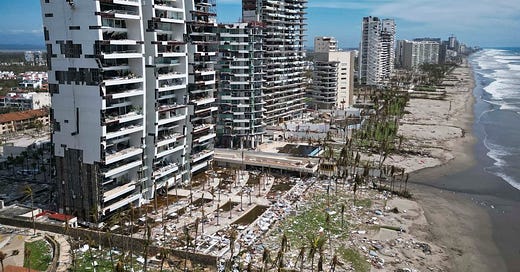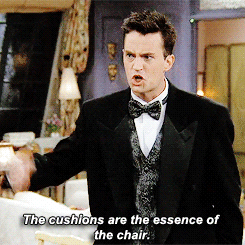The State of Play - November 1, 2023
In this edition: How Gazans feel about Hamas, Hurricane Otis, insurance companies, Haiti and daylight savings time.
Most Gazans do not support Hamas
Hamas may have won the most recent election held in Gaza (in 2006), but that doesn’t mean all Palestinians in Gaza have positive feelings towards Hamas, let alone support what Hamas did to Israel last month.
In an opportunely-timed Arab Barometer survey, one of the chief data collectors in the region, the firm conducted interviews with Palestinians living in Gaza and the West Bank, almost immediately preceding Hamas’s attack. In a Foreign Affairs essay last week, the co-founder and another director at Arab Barometer discussed their findings.
Our most recent interviews were carried out between September 28 and October 8, surveying 790 respondents in the West Bank and 399 in Gaza. (Interviews in Gaza were completed on October 6.) The survey’s findings reveal that Gazans had very little confidence in their Hamas-led government. Asked to identify the amount of trust they had in the Hamas authorities, a plurality of respondents (44 percent) said they had no trust at all; “not a lot of trust” was the second most common response, at 23 percent….Overall, the survey responses indicate that Gazans desire political change….When asked what is the most effective way for ordinary people to influence the government, a plurality said “nothing is effective.”
Palestinian feelings though go beyond having little faith in Hamas as a government though. Arab Barometer’s results suggest that most Gazans disapprove of Hamas’s use of violence.
By and large, Gazans do not share Hamas’s goal of eliminating the state of Israel. When presented with three possible solutions to the Israeli-Palestinian conflict (as well as an option to choose “other”), the majority of survey respondents (54 percent) favored the two-state solution outlined in the 1993 Oslo accords. In this scenario, the state of Palestine would sit alongside the state of Israel, their borders based on the de facto boundary that existed before the 1967 Six-Day War. The level of support for this resolution has not changed much since 2021; in that survey, 58 percent of respondents in Gaza selected the two-state solution….
Overall, 73 percent of Gazans favored a peaceful settlement to the Israeli-Palestinian conflict. On the eve of Hamas’s October 7 attack, just 20 percent of Gazans favored a military solution that could result in the destruction of the state of Israel. A clear majority (77 percent) of those who provided this response were also supporters of Hamas, amounting to around 15 percent of the adult population. (PTO emphasis added)
So prior to the attack, the vast majority were dissatisfied with Hamas, and opposed to its use of force. But why didn’t Gazans rise up and try to take down Hamas? As Jonah Shepp noted in the Intelligencer, Gaza’s economy is so weak, and Hamas controls virtually the entire thing, that Gazans depended on Hamas for survival.
For one thing, [most Gazans] are too busy struggling to survive from day to day. For another, Hamas cements its hold on power through an outsize role in the Gazan economy: It is the only organization that can reliably pay salaries, it maintains a stranglehold on inflows of foreign aid, and it keeps Gaza dependent on Israel for water and electricity by refusing to build infrastructure instead of rockets. If your ability to feed your family depends on Hamas patronage, even if you’d like to stand up to them, why risk it?
Gaza’s GDP has barely grown since 1994, and has dropped on a per capita basis.

As Israel seeks appropriate retribution for Hamas’s horrible attack on innocent Israelis, remember that Hamas does not speak for, nor represent, the vast majority of Gazans.
Hurricane Otis was an anomaly outside of any model’s wildest predictions
Keep reading with a 7-day free trial
Subscribe to Nuance Matters to keep reading this post and get 7 days of free access to the full post archives.




